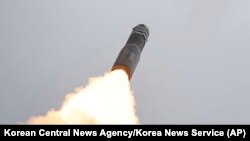North Korea has confirmed its latest weapons launch was a second test of its newest intercontinental ballistic missile, the Hwasong-18, saying it will "clearly show" Washington the danger and recklessness of its military choices on the peninsula.
The North's leader, Kim Jong Un, who was present at the morning launch, also warned of "a series of stronger military offensive[s] ... until the U.S. imperialists and the South Korean puppet traitors admit their shameful defeat of their useless hostile policy" against Pyongyang, according to state media KCNA Thursday.
The report added that the region is in a "phase of nuclear crisis beyond the Cold War era," citing the deployment of an American nuclear-powered submarine and nuclear strategic bombers to South Korea as well as a planned inaugural meeting of the allies' Nuclear Consultative Group (NCG) next week.
Both are commitments the U.S. made to Seoul as part of the Washington Declaration in April to galvanize deterrence amid growing North Korean threats and to reassure the South Korean public of its commitment to defend it in the event of a nuclear emergency on the peninsula.
The Hwasong-18 ICBM is part of North Korea's long-term plan to build a state nuclear force, KCNA said, to deter and overwhelmingly respond to "the diverse threat of a nuclear war" and reliably defend its security.
Longest-running flight
The three-stage solid-fueled ICBM Wednesday soared at a lofted trajectory for 74.8 minutes, state media said, North Korea's longest-running flight to date. It hit an apex of 6,648.4 kilometers to splash down in waters 1,001.2 kilometers from its point of launch, Pyongyang confirmed.
South Korea's Defense Ministry would not provide additional details during a regular briefing Thursday, saying only that analysis of intelligence is continuing with their U.S. counterparts.
Analysts in Seoul say Wednesday's launch shows that progress has been made since the initial test in April, during which the Hwasong-18 reached a top altitude short of 3,000 kilometers.
"The [doubled] engine thrust is strong enough to deliver a 1,000-kilogram payload farther than 15,000 kilometers," said Kim Dong Yup, a professor of military and security studies at the University of North Korean Studies in Seoul. That range would put the U.S. mainland within reach.
"It's in line with goals presented at the Eighth Party Congress in 2021, to advance North Korea's nuclear preemptive and retaliatory strike capabilities with the ability to annihilate targets within that 15,000-kilometer range."
While more tests are still needed, the Hwasong-18 could feature prominently at a military parade later this month, marking the 70th anniversary of the pause in the Korean War, which North Korea claims it won. It could be a rare but meaningful military display for Kim Jong Un's regime, which showed off only a model of the new ICBM in February.
Security Council meets
Meanwhile, the U.N. Security Council met late Thursday to discuss the launch but remained divided about taking action. China and Russia continued to advocate for easing pressure and sanctions on Pyongyang, while several other council members recalled that the last resolution adopted in 2017 called for considering new measures in the face of violations.
“We should all ask ourselves: Is it our job to sit back and wait for North Korea to steadily develop the capability to target the world with nuclear weapons and take hostage the entire international community?” Japan’s Deputy Ambassador Shino Mitsuko asked, adding there had been too many provocations and no tangible and responsible council action.
Pyongyang has launched 20 ballistic missiles so far this year, including four ICBMs.
North Korea’s envoy, Kim Song, made a rare appearance, participating in his first Security Council meeting since 2017 to address Pyongyang’s ballistic missile launches. He said it was his government’s right to exercise its self-defense, and he blamed the “hostile policy” of the United States and its allies toward his nation.
Group of Seven foreign ministers also strongly condemned North Korea's launch in a statement Thursday and called for “a quick, strong and unified response” from the U.N. Security Council.




